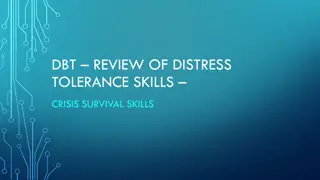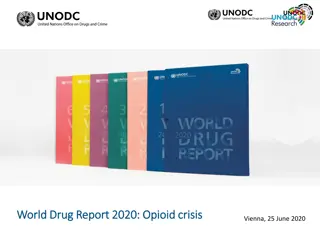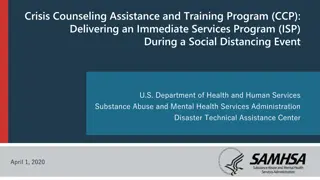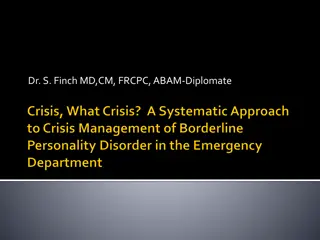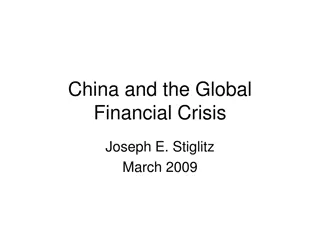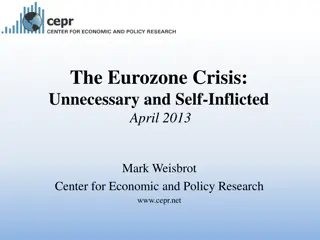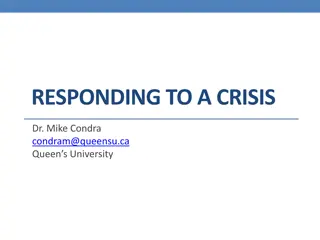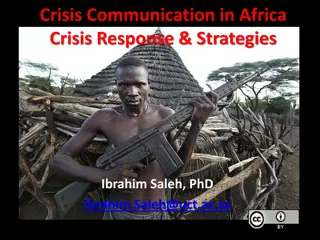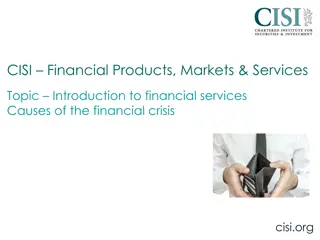Understanding the Fentanyl Crisis: Impacts and Adaptations
The fentanyl crisis, a significant aspect of the opioid epidemic, has led to a surge in overdose deaths, with devastating effects on various demographics. This crisis has prompted shifts in drug policies, healthcare responses, and user behaviors to address the dangers posed by fentanyl-laced substan
0 views • 6 slides
Crisis Management in Organizational Context: Understanding, Planning, and Response
Crisis management is essential for organizations to navigate unexpected and high-risk situations effectively. A crisis is a time of intense difficulty or danger that requires strategic decision-making and communication under pressure. The phases of crisis management include pre-crisis prevention, pr
1 views • 37 slides
School Crisis Management in the Digital Age
Addressing a school crisis involving a suicidal student through a tabletop exercise reveals the importance of adapting to technology considerations. From identifying warning signs, involving law enforcement, managing rumors, to leveraging virtual crisis rooms, the crisis team navigates challenges in
0 views • 9 slides
DBT Review of Distress Tolerance Skills & Crisis Survival Techniques
Explore DBT review of distress tolerance skills and crisis survival tactics including STOP method, pros/cons evaluation, crisis urge management, TIP technique and Wise Mind principles. Learn when to apply crisis survival skills and how they can aid in managing short-term crises effectively.
1 views • 15 slides
Overview of Opioid Crisis in North America and Africa
The opioid crisis in North America and Africa presents common threats and differing dynamics. Factors such as ease of manufacturing, interchangeability of fentanyl and tramadol, and market dynamics contribute to the crisis. In North America, high rates of prescription opioids have led to diversion a
1 views • 26 slides
Factors Affecting the Hydrological Cycle: Understanding Physical and Human Influences
The hydrological cycle is influenced by both physical and human factors. Physical factors such as relief, vegetation, basin size, rock type, soil type, and climate all play a role in shaping the movement of water through the cycle. Human activities like forestry, urbanization, deforestation, mining,
2 views • 20 slides
Understanding the Accounting Cycle Process
The accounting cycle is a comprehensive process that involves recording and processing all financial transactions of a company, from their occurrence to their representation in financial statements and closing of accounts. It is crucial for bookkeepers to manage the entire cycle, which includes step
0 views • 11 slides
Urea Biosynthesis and the Krebs-Henseleit Cycle in the Liver
Urea is synthesized in the liver through a series of enzymatic steps known as the urea cycle or Krebs-Henseleit cycle. This process involves converting toxic ammonia into urea, a less toxic and water-soluble compound that can be easily excreted in urine. The liver plays a crucial role in urea biosyn
1 views • 20 slides
KDADS IDD Crisis Exception Training Overview
This document provides an overview of the KDADS IDD Crisis Exception Training held on October 28, 2020. It includes information on the agenda, purpose of the training, review of the current process, and policies related to crisis exceptions in IDD programs. The training aimed to streamline the crisi
1 views • 16 slides
Understanding the Cycle of Erosion: Applied Geomorphology Perspective
The Cycle of Erosion model, developed by Davis in the 1880s, explores the process of landmass upliftment, river erosion, and landscape transformation. The Normal Cycle of Erosion focuses on fluvial processes as the primary geomorphic agent, leading to the formation of peneplains. This cycle progress
0 views • 23 slides
Understanding the Accounting Cycle
The accounting cycle is a comprehensive process that involves recording and processing all financial transactions of a company, from their occurrence to their representation on financial statements and closing the accounts. This cycle, essential for bookkeepers, includes steps like transactions, jou
0 views • 11 slides
Water Crisis in Jordan: Causes, Consequences, and Solutions
The water crisis in Jordan is primarily due to water shortage, with the Jordan River running nearly dry. This crisis has severe consequences, including rapidly decreasing water resources, leading to a water stress crisis. However, solutions such as reservoirs, rainwater harvesting, and water conserv
2 views • 7 slides
Crisis Counseling Assistance and Training Program (CCP) Overview
The Crisis Counseling Assistance and Training Program (CCP) offers short-term disaster relief grants to states, U.S. territories, and federally recognized tribes. CCP grants support community-based outreach by training local individuals to provide services such as crisis counseling and emotional dis
0 views • 26 slides
Local Welfare Provision - Assistance for Crisis Situations
Bedford Borough Council introduced the Local Welfare Provision to offer Crisis Grants and Home in the Community Grants to residents experiencing unforeseen crisis or hardship. Crisis Grants support immediate health and safety risks arising from disasters, with assistance such as energy top-up vouche
1 views • 11 slides
Understanding Borderline Personality Disorder (BPD) Crisis Presentations
Borderline Personality Disorder (BPD) is a common and challenging disorder, especially in clinical populations. With prevalence varying from 1-2% in the general population to up to 25% in agitated emergency patients, BPD often presents in crisis situations, leading to suicidal behavior and frequent
1 views • 41 slides
Understanding the Calvin Cycle in Photosynthesis
The Calvin cycle, also known as the light-independent reactions, is a crucial part of photosynthesis where carbon dioxide is converted into glucose. This cycle occurs in the stroma of chloroplasts and utilizes ATP and NADPH from the light-dependent reactions to produce sugars for plants. It consists
5 views • 15 slides
Ideal Reheat Rankine Cycle Analysis for Steam Power Plant
Analyzing the thermal efficiency and mass flow rate of an ideal Rankine cycle with superheat and reheat using steam as the working fluid. The cycle involves stages of expansion, reheating, and condensing to generate a net power output of 100 MW. Detailed calculations for states of the cycle are prov
1 views • 5 slides
Adapting Contest Strategies for Declining Solar Cycle 24 and Solar Cycle 25 Precursors
As Solar Cycle 24 rapidly declines, preparations for the subsequent Solar Cycle 25 are crucial. Insights on weak solar activity, potentially weak Cycle 25, and the impact on contest strategies are discussed. Improved DX propagation, reliable openings, and signal strengths to Europe and Japan, amidst
0 views • 12 slides
Enhancing Mental Health Crisis Response in Waterloo Region
The Waterloo Region Specialized Crisis Team Project aims to improve the response to individuals in mental health crisis by strengthening collaboration between police, community mental health, and acute mental health services. Through strategic partnerships and funding, the project has implemented me
0 views • 30 slides
Water Crisis in Jordan: Causes, Consequences, and Solutions
Jordan is facing a severe water crisis due to climate change and population growth, leading to water scarcity and challenges in accessing clean water. This crisis has significant impacts on food security, human conflict, and child development. To address this issue, individuals can adopt water-savin
0 views • 8 slides
The Global Financial Crisis: Impact on China and the Global Economy
The global financial crisis described by Joseph E. Stiglitz in March 2009 highlights the interconnectedness of economies and the challenges faced by various countries. The crisis has led to a deep and prolonged downturn affecting both developed and developing nations, debunking the myth of decouplin
0 views • 33 slides
Odwalla's Renewal Strategies in the E. coli Apple Juice Crisis
Analyzing Odwalla's discourse and strategic responses during the E. coli apple juice crisis, from the pre-crisis phase to post-crisis innovative solutions. The crisis management timeline includes key events such as the FDA investigation, voluntary recall, corrective actions, and strategic planning t
0 views • 20 slides
Strategies for Managing Challenging Behaviors in Educational Settings
Explore effective strategies for managing challenging behaviors in schools, focusing on the crisis cycle, pyramid model of behavior support, and phases of the crisis cycle. Learn about proactive interventions, understanding students' needs, and promoting a calm learning environment to enhance behavi
0 views • 37 slides
Understanding the Eurozone Crisis: A Critical Analysis
The Eurozone crisis of April 2013 was deemed unnecessary and self-inflicted by Mark Weisbrot. Contrary to conventional wisdom, the crisis was not solely a debt crisis but also a result of the world financial crisis and recession. Countries like Spain and Ireland, which were reducing their Debt/GDP r
0 views • 51 slides
Fuel Cycle Analysis Toolbox: Enhancing Understanding and Optimization
This presentation focuses on the analyses and evaluations essential for assessing the potential of a fuel cycle, emphasizing different time scales, system sizes, objectives, and audiences. It discusses the need for coupled analyses, various tools required, and opportunities for improvement through i
1 views • 11 slides
Enhancing Communication for Effective Crisis Management in Juneau County
Collaborative efforts between Juneau County Department of Human Services and Law Enforcement Agencies aim to reduce emergency detentions by improving assessments, utilizing least restrictive means, and enhancing communication strategies. The implementation of direct lines between law enforcement and
0 views • 6 slides
Improving Mental Health Crisis Care with NELFT Street Triage Service
NELFT's Street Triage service, led by Deputy Director Wellington Makala, collaborates with police and mental health professionals to provide on-the-spot advice for individuals facing mental health crises. The Crisis Care Concordat emphasizes the importance of joint working between various services t
0 views • 21 slides
Role of Cell Cycle in Nanoparticle Uptake and Dilution in Cell Population
The cell cycle plays a crucial role in the cellular uptake and dilution of nanoparticles within a cell population. This process involves different phases such as G1, S, G2, and M, each with specific functions related to cell growth, DNA synthesis, protein synthesis, and cell division. Understanding
0 views • 20 slides
Organizing in Times of Crisis: Strategies for Managing the Unexpected
Explore the innovative strategies proposed by Prof. Dr. Daniel Geiger on organizing in times of crisis, focusing on preparing organizations to effectively deal with unexpected events like the COVID-19 pandemic. The content delves into the phases of crisis unfolding, managing the tension between stab
0 views • 13 slides
Fundamentals of Environmental Thermal Engineering in Mechanical & Aerospace Engineering
Explore the key concepts of environmental thermal engineering in Mechanical & Aerospace Engineering, covering topics such as the Carnot cycle, actual vapor-compression cycle, principles of the vapor-compression cycle, Carnot heat engine, refrigeration cycle, and coefficient of performance. Understan
0 views • 51 slides
Understanding the Global Water Crisis: Causes, Consequences, and Solutions
The world is facing a severe water crisis, with billions lacking access to safe drinking water and sanitation. This crisis poses significant risks to society, leading to deadly diseases and limiting essential resources. Solutions like recycling wastewater are crucial in addressing water scarcity. Va
0 views • 6 slides
Unraveling the Financial Crisis: A Weekend Reader's Guide
Delve into the financial crisis of 2007-2009 with "Getting Up to Speed on the Financial Crisis: A One-Weekend Reader's Guide" by Harrison Li. Explore the bankruptcy of Lehman Brothers, the triggers, vulnerabilities, and events that shaped the crisis. Understand the timeline, system vulnerabilities,
0 views • 32 slides
Crisis Communication Plan and Team Overview
Crisis communication plans are essential for organizations to effectively communicate with stakeholders during a crisis. This detailed plan outlines key steps, important contacts, and the roles of the crisis management team. It emphasizes the importance of evaluating each crisis situation individual
0 views • 11 slides
Understanding and Dealing with Crisis: A Comprehensive Guide
Crisis can leave individuals feeling overwhelmed, helpless, and unable to cope, affecting their emotions, thoughts, and behaviors. Recognizing the signs of a crisis and understanding the components involved can help in effectively managing and responding to such situations. This guide explores the d
0 views • 15 slides
Marx's Critique of Capitalism During the 1857 World Economic Crisis
In 1857, amidst a world economic crisis, Karl Marx worked tirelessly on his economic manuscript, the Grundrisse, focusing on the political economy outlines and the current crisis. He aimed to create a pamphlet to remind the German public of his presence. Marx identified France as a potential site fo
0 views • 13 slides
Crisis Communication in Africa: Strategies and Response
Explore the key principles of crisis communication in Africa through expert insights and quotes. Learn about crisis response strategies, the importance of accurate information dissemination, and steps for effective crisis management. Discover the significance of the "Golden Hour" and surviving the i
0 views • 29 slides
Exploring the Rock Cycle Using the Crayon Rock Cycle Model
This educational resource focuses on teaching students aged 11-16 about the rock cycle, including the types of rocks, how rocks transform over time, and the importance of models in science. It introduces the crayon rock cycle model as a hands-on demonstration to help students grasp the cyclic nature
0 views • 4 slides
Managing Reputation Risk Through the Life Cycle
Explore strategies for managing reputation risk through the life cycle, including post-crisis recovery, stakeholder engagement, and crisis preparedness. Learn to categorize risks, enhance reputation, protect organizational resilience, and utilize strong reputation for strategic goals. The process in
0 views • 12 slides
Understanding the Causes and Fallout of the 2008 Financial Crisis
The 2008 financial crisis stemmed from a mix of factors such as subprime mortgage lending, lack of regulations, and risky investments. It led to a downward spiral with mortgage defaults, plummeting house prices, and a deep recession. Various entities including individuals, banks, and governments wer
0 views • 4 slides
Psychiatric Crisis Services Overview in Milwaukee County
Crisis Services in Milwaukee County Behavioral Health Division (BHD) provides comprehensive mental health emergency support through various programs, including Psychiatric Crisis Services (PCS/OBS). Available 24/7, PCS serves individuals facing acute mental health emergencies, providing triage, asse
0 views • 15 slides



